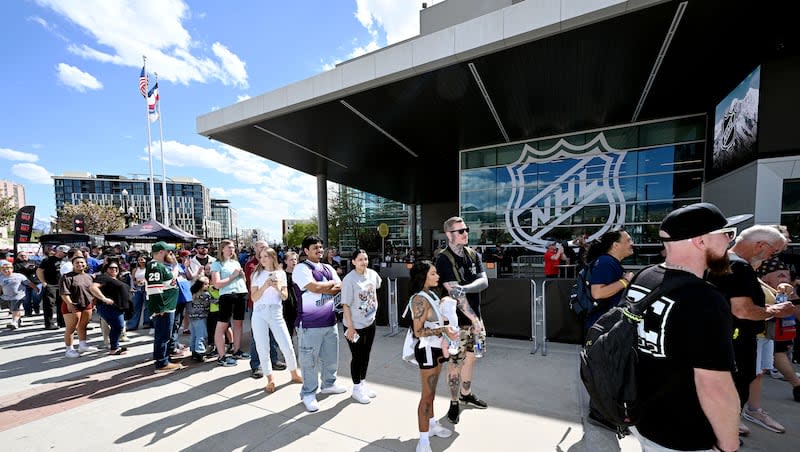Documents reveal what Ryan Smith wants to see in Salt Lake City entertainment zone

Ryan Smith has talked generally about how he’d like to see downtown Salt Lake City reimagined around the Delta Center to enhance the experience of attending a Utah Jazz or Utah hockey club game.
But an application Smith Entertainment Group filed with the city for a 100-acre revitalization zone under a new state law provided a little more insight into what could happen around the arena over the next few years. It doesn’t include specific plans.
SEG proposes to develop the area as a sports and entertainment district with a variety of commercial uses, including retail, restaurants, hospitality, multifamily residential, and other entertainment and cultural uses and parking. It includes remodeling the Delta Center over several offseasons to accommodate both the Jazz and the hockey team.
“Development of the project area, including the Delta Center remodel, will require substantial redevelopment, urban renewal and reconstruction, which will likely include the re-routing, permanent closure and/or bridging of certain surrounding streets,” according to the application.
In addition, SEG wants the city to revise zoning ordinances to eliminate maximum height limitations in the project zone and identify “arenas,” “stadiums,” “heliports,” “parking, commercial” and “parking, off-site” as permitted uses.
SEG submitted the seven-page document to the mayor’s office on April 4, two weeks before the NHL announced Ryan and Ashley Smith had bought the Arizona Coyotes on April 18. The Deseret News requested the application on April 17 under Utah’s public records access law but the city denied it, citing “business confidentiality.” The newspaper appealed and the city provided the documents late Thursday, saying SEG has waived its business confidentiality claim.
Earlier this year, the Utah Legislature, with Salt Lake City and Salt Lake County support, passed legislation allowing the creation of a downtown revitalization zone. Under the law, the city could raise its current 7.75% sales tax rate one-half of a percent — pushing it to 8.25% over no more than 30 years to help fund construction or remodeling of a sports arena. The tax increase could generate in the neighborhood of $1 billion.
“In order to make the subject property financially viable, and in order to maximize the overall positive impact of the project to the surrounding community, and to justify the significant private investment, a significant amount of public financing is required in connection with SEG’s development of the project area,” the application says.
In the application, SEG proposed to receive the “full amount” for the full 30 years. It would subtract 1% of the taxes collected as administrative fee to the city and an undetermined amount as agreed upon with Salt Lake County for its renovation of the Salt Lake Palace Convention Center. SEG also says the project might require tax increment financing and creation of a public infrastructure district.
“Tax increment financing will be justified based on the project’s significant and long lasting positive impacts, including promoting, creating and retaining jobs, improving surrounding property values, attracting increased outside private and public investment, increasing tax revenues, improving the overall aesthetic and functionality of the project area and surrounding areas, enhancing cultural and entertainment opportunities, increasing tourism, and boosting the overall vitality of Salt Lake City,” according to the application.
The documents note that the Delta Center is currently part of a property tax reimbursement agreement with the Salt Lake City Redevelopment Agency that started in 2019 and runs through 2040. To date, SEG has received about $3.5 million of the maximum $22.7 million over that time. SEG also leases the block on which the Delta Center sits from the RDA and is proposing a new 99-year-lease on the same terms. It also wants to lease two additional blocks east of the arena from Salt Lake County, though the purpose isn’t specified in the documents.
The application doesn’t include any specific blueprints but at a news conference announcing the Coyotes’ move to Utah last month, Smith said he “can’t wait to kind of show the plans of how we’re going to do it.”
At the news conference, Smith talked about his vision for downtown Salt Lake City, noting he and government officials recently visited L.A. Live in downtown Los Angeles. The sports and entertainment district that surrounds Crypto.com Arena located next to the Los Angeles Convention Center includes sports and music venues, night clubs, restaurants, a bowling alley, museum and movie theater.
Smith said the fan experience should start before walking into the arena. He said he’d like to see families head downtown at 3 p.m. for a night game and then hang out afterward. He’s also keen on providing housing so players can live next door. He also talked about improving the flow between the Delta Center and convention center and other downtown attractions.
“It’s not about the arena renovation. It’s just not. It’s about everything else around it,” he said.
Salt Lake City Mayor Erin Mendenhall told state lawmakers in February the project would link the east and west sides of downtown, including the Delta Center, Temple Square, the theater district, and the City Creek and Gateway malls.
Smith sidestepped a question about whether residents would support a tax increase for the project.
“It’s going to take everyone. It’s going to take the county and it’s going to take the city from a tax standpoint but we’ll generate a lot of revenue,” he said. “I think down the road everyone will look back and go, ‘Wow, at a time when we needed to revitalize, reimagine, we invested and it worked out.’”

